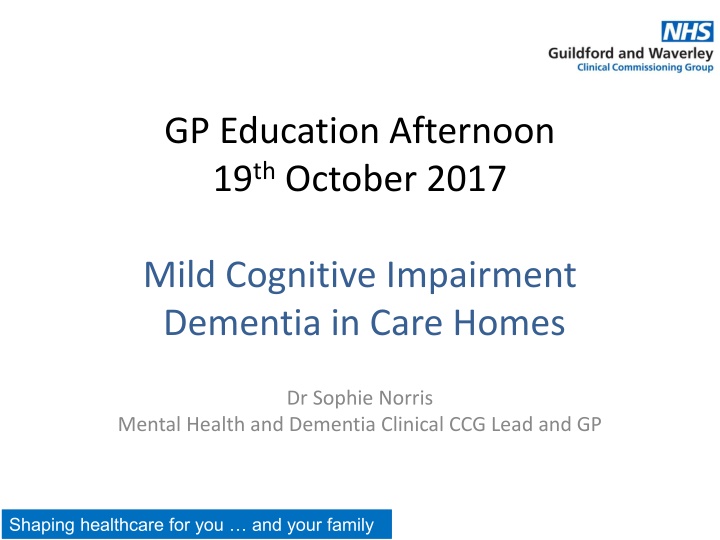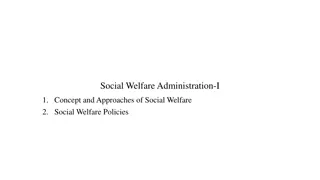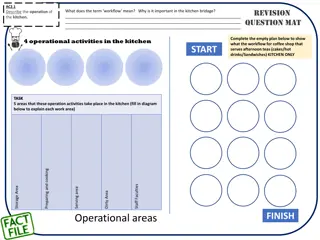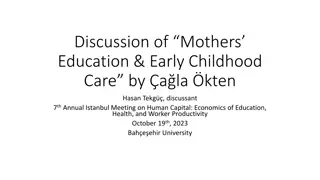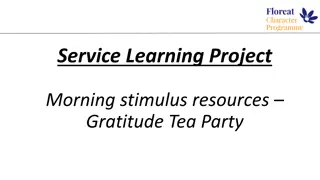GP Education Afternoon
Mild Cognitive Impairment (MCI) is distinct from normal aging and dementia, with signs of memory difficulty. Recognizing MCI is crucial as it can progress to dementia. Follow-up is essential for monitoring and risk reduction. Recommendations include lifestyle changes like exercise and brain-stimulating activities. Primary care systems should incorporate MCI assessment and annual reviews. The goal is early detection and intervention to prevent or delay progression to dementia.
Download Presentation

Please find below an Image/Link to download the presentation.
The content on the website is provided AS IS for your information and personal use only. It may not be sold, licensed, or shared on other websites without obtaining consent from the author.If you encounter any issues during the download, it is possible that the publisher has removed the file from their server.
You are allowed to download the files provided on this website for personal or commercial use, subject to the condition that they are used lawfully. All files are the property of their respective owners.
The content on the website is provided AS IS for your information and personal use only. It may not be sold, licensed, or shared on other websites without obtaining consent from the author.
E N D
Presentation Transcript
GP Education Afternoon 19thOctober 2017 Mild Cognitive Impairment Dementia in Care Homes Dr Sophie Norris Mental Health and Dementia Clinical CCG Lead and GP Shaping healthcare for you and your family Shaping healthcare for you and your family
Mild Cognitive Impairment (MCI) Key Facts and Recommendations for Management South East Clinical Networks Shaping healthcare for you and your family Shaping healthcare for you and your family
Key Facts about MCI Different from normal ageing, there is objective evidence of memory difficulty, may drop one or two points on GPCOG. Differs from dementia because dementia affects a person s everyday activities and is more than just memory loss. Important to recognise because it occupies a position between normal ageing and dementia, similar to an abnormal glucose tolerance for diabetes. Affects up to 20% of people over 65. About a third may get better (showing symptoms were due to a transient physical or emotional illness). One third stay the same and one third go on to develop dementia (15 times more likely than the general population). Shaping healthcare for you and your family Shaping healthcare for you and your family
Following people up is the only way at present to distinguish those people who are getting worse. This is also a great opportunity to talk about dementia risk reduction/prevention What s good for your heart s good for your head . Advise about the importance of healthy lifestyle (exercise, alcohol within recommended limits, no smoking), nutrition, keeping your brain active (puzzles, cross words, suduko). Shaping healthcare for you and your family Shaping healthcare for you and your family
MCI Recommendations Code on primary care systems: Read Code Eu057 or CTv3 code X00RS. Include on the problem page so it is apparent whenever the patient attends an appointment. Review at least annually in primary care, and ask two simple questions about their memory and/or how they are managing. Examples of questions: Do you remember being referred to a specialist clinic last year to investigate how well you remember things? How are things now better, the same or are you concerned? How are you coping with every day things e.g. bills, remembering family events, driving? Shaping healthcare for you and your family Shaping healthcare for you and your family
Outcome of MCI review Concerns about deterioration in memory or functioning Re-evaluate using usual dementia screening process before rereferral to memory clinic: Bloods Screen for depression Exclude physical illness and side effects from medication History from patient and carer/family Dementia screening tool eg GP- cog No concerns about deterioration in memory or functioning Review again in 12 months Shaping healthcare for you and your family Shaping healthcare for you and your family
Why Diagnose Dementia In Care Homes? Shaping healthcare for you and your family Shaping healthcare for you and your family
Diagnosing Dementia in Care Homes Around three-quarters of people living in residential and nursing homes have dementia. Some residents will have been assessed in the past and have a recorded diagnosis of dementia. However, many will have bypassed pathways to formal diagnosis if they were admitted from direct from hospital, placed as an emergency because of severe risks or a breakdown in home support or were admitted from outside the locality with limited background information coming with them. Shaping healthcare for you and your family Shaping healthcare for you and your family
It might be argued that there is limited benefit in diagnosing people with significant physical illness and high care needs as having dementia, as it will have little impact on their care. However, diagnosis, even in the presence of established disease, can have important practical benefits: Some care home residents have mild or moderate dementia and symptoms which may be helped by cholinesterase inhibitor drugs or memantine. These diagnoses may be missed as they may appear to care home staff as relatively cognitively intact compared with other residents with more severe dementia and present no challenges to care labels such as pleasantly confused are often attributed to them. A diagnosis of dementia may trigger a general review of a resident s medication and the stopping of drugs which may affect cognition adversely. The diagnosis can be recorded in the care home records which are useful for health and social care professionals who may be assessing the resident, prompts staff to consider MCA and DOLs issues where appropriate. Shaping healthcare for you and your family Shaping healthcare for you and your family
A diagnosis can help care home staff understand behaviours which may emerge people with dementia are at significantly increased risk of developing a confused state in the presence of an intercurrent physical illness and can alert clinicians to the risks of prescribing neuroleptic drugs. Care staff may need to alter their care plans if a resident has cognitive impairment, for example to manage distress due to disorientation. A diagnosis of dementia in a care home resident can act as a trigger for a discussion about advance care planning, addressing such important areas like how to manage physical illness and when and when not to admit to hospital. Relatives and friends may find a formal diagnosis of dementia helpful as it helps them to understand some of the changes they have seen in their loved one and helps them to contribute in an informed way to their relatives care. Shaping healthcare for you and your family Shaping healthcare for you and your family
DiADeM (Diagnosis of Advanced Dementia Mandate in Care Homes) DiADeM aims to support GPs to diagnose dementia for people living with advanced dementia in a care home setting. Designed to be used with those patients for whom a trip to memory services is unlikely to be feasible, would be distressing and/or would not make a difference to ongoing management. A diagnosis of dementia can be made with a high degree of certainty if all five criteria listed in the protocol are met. Shaping healthcare for you and your family Shaping healthcare for you and your family
Thank You Shaping healthcare for you and your family Shaping healthcare for you and your family
